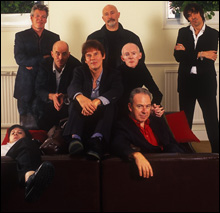 It was 1985 and it was time for a new kind of kick. I did not expect to find it with guys playing tin whistle, banjo, and accordion, and a guy who used to sing for the B-level punk band, the Nips (nés Nipple Erectors) — that would be the dentally challenged Shane MacGowan. Oh, and there would be a diffident female bassist named Caitlin who would later marry (and get divorced from) Elvis Costello. But find it I did.
It was 1985 and it was time for a new kind of kick. I did not expect to find it with guys playing tin whistle, banjo, and accordion, and a guy who used to sing for the B-level punk band, the Nips (nés Nipple Erectors) — that would be the dentally challenged Shane MacGowan. Oh, and there would be a diffident female bassist named Caitlin who would later marry (and get divorced from) Elvis Costello. But find it I did.
The first waves of punk rock had come and gone, and new wave had devolved into Culture Club and Duran Duran. I found myself in London early that year, and Frankie Goes to Hollywood had a gig in town. I said no to Frankie and headed to the outskirts, to a club called the Mean Fiddler, to hear a buzzed-about band of London-based Celtic punks, the Pogues. It was physical, but friendly. MacGowan sang lines like “Lend me 10 pounds and I’ll buy you a drink.” He meant it.
I first met MacGowan and the Pogues shortly thereafter at the band’s favorite haunt, Filthy McNasty’s, where I mentioned the contrast between their rich, acoustic instrumentation and Irish melodic lilt on the one hand and their punk fury on the other. “I don’t think there’s that much of a contradiction,” MacGowan said, a drink in each hand. “They’re both about complete, total emotion — blasting out.”
The following year, the band arrived in Boston to play a packed show at Spit (now Axis). It was London all over again, as Irish ex-pats banged up against homegrown punks to the sound of a band who seemed ready to conquer the world. And so it could have been. Unfortunately, MacGowan’s well-publicized problems with drugs and alcohol would take a steady toll on the Pogues’ momentum. He didn’t just sing about “Streams of Whiskey,” he lived them. By ’91, MacGowan, who’d developed a habit of missing gigs, had been given the boot, and except for one tour with Joe Strummer in his place, the Pogues had lost their punk. That is, until recently, when the two parties renewed their partnership and began playing the occasional reunion gig — a development that’s led up to a short US tour that’ll bring the band, with MacGowan up front, to the Orpheum this Tuesday and Wednesday for sold-out shows.
“There was never really any bad blood,” tin-whistle player Spider Stacy tells me over the phone from London. “There really wasn’t. We went our separate ways. It had to happen. And everyone realized that.” Indeed, Stacy and fellow Pogue Jem Finer played on MacGowan’s import-only 2000 solo disc The Snake.
“We’ve always been very close, like a family,” says Finer, who plays banjo, mandolin, and accordion. “But toward the end, things got a bit fractured and some issues came up.”